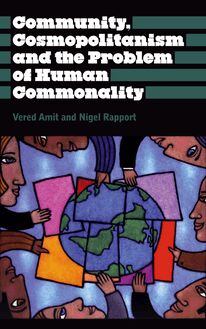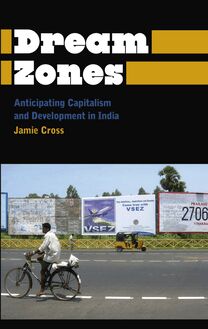Power and Its Disguises , livre ebook
182
pages
English
Ebooks
2000
Vous pourrez modifier la taille du texte de cet ouvrage
Obtenez un accès à la bibliothèque pour le consulter en ligne En savoir plus
Découvre YouScribe et accède à tout notre catalogue !
Découvre YouScribe et accède à tout notre catalogue !
182
pages
English
Ebooks
2000
Vous pourrez modifier la taille du texte de cet ouvrage
Obtenez un accès à la bibliothèque pour le consulter en ligne En savoir plus
Publié par
Date de parution
20 juillet 2000
Nombre de lectures
5
EAN13
9781783718627
Langue
English
Examples are drawn from Brazil, Cameroon, Democratic Republic of Congo, Guatemala, Indonesia, India, Mexico, Peru, Sierra Leone, South Africa and Sri Lanka, amongst others.
Preface To The Second Edition
1. Locating The Political: A Political Anthropology For Today
2. The Origins And Limits Of Coercive Power: The Anthropology Of Stateless Societies
3. From Hierarchy To Surveillance: The Politics Of Agrarian Civilizations And The Rise Of The Western National State
4. The Political Anthropology Of Colonialism: A Study Of Domination And Resistance
5. Post-Colonial States: Legacies Of History And Pressures Of Modernity
6. From Macro-Structure To Micro-Process: Anthropological Analysis Of Political Practice
7. Political Process And ‘Global Disorder’: Perspectives On Contemporary Conflict And Violence
8. Society Against The Modern State?: The Politics Of Social Movements
9. Anthropology And Politics: Commitment, Responsibility And The Academy
Bibliography
Index
POWER AND ITS DISGUISES
Anthropology, Culture and Society
Series Editors: Professor Vered Amit, Concordia University and Dr Jon P. Mitchell, University of Sussex
Published titles include:
Home Spaces, Street Styles: Contesting Power and Identity in a South African City
L ESLIE J. B ANK
On the Game: Women and Sex Work
S OPHIE D AY
Slave of Allah: Zacarias Moussaoui vs the USA
K ATHERINE C. D ONAHUE
A World of Insecurity: Anthropological Perspectives on Human Security
E DITED BY T HOMAS E RIKSEN , E LLEN B AL AND O SCAR S ALEMINK
A History of Anthropology T HOMAS H YLLAND E RIKSEN AND F INN S IVERT N IELSEN
Ethnicity and Nationalism: Anthropological Perspectives Second Edition
T HOMAS H YLLAND E RIKSEN
Globalisation: Studies in Anthropology
E DITED BY T HOMAS H YLLAND E RIKSEN
Small Places, Large Issues: An Introduction to Social and Cultural Anthropology Second Edition
T HOMAS H YLLAND E RIKSEN
What is Anthropology?
T HOMAS H YLLAND E RIKSEN
Anthropology, Development and the Post-Modern Challenge
K ATY G ARDNER AND D AVID L EWIS
Corruption: Anthropological Perspectives
E DITED BY D IETER H ALLER AND C RIS S HORE
Culture and Well-Being: Anthropological Approaches to Freedom and Political Ethics
E DITED BY A LBERTO C ORSIN J IMÉNEZ
Cultures of Fear: A Critical Reader
E DITED BY U LI L INKE AND D ANIELLE T AANA S MITH
Fair Trade and a Global Commodity: Coffee in Costa Rica
P ETER L UETCHFORD
The Will of the Many: How the Alterglobalisation Movement is Changing the Face of Democracy
M ARIANNE M AECKELBERGH
The Aid Effect: Giving and Governing in International Development
E DITED BY D AVID M OSSE AND D AVID L EWIS
Cultivating Development: An Ethnography of Aid Policy and Practice
D AVID M OSSE
Anthropology, Art and Cultural Production
M ARUŠKA S VAŠEK
Race and Sex in Latin America
P ETER W ADE
Race and Ethnicity in Latin America
P ETER W ADE
Anthropology at the Dawn of the Cold War: The Influence of Foundations, McCarthyism and the CIA
E DITED BY D USTIN M. W AX
Learning Politics from Sivaram: The Life and Death of a Revolutionary Tamil Journalist in Sri Lanka
M ARK P. W HITAKER
POWER AND ITS DISGUISES
Anthropological Perspectives on Politics
Second Edition
J OHN G LEDHILL
First published 1994
Second Edition 2000
PLUTO PRESS
345 Archway Road, London N6 5AA and
175 Fifth Avenue, New York, NY 10010
www.plutobooks.com
Distributed in the United States of America exclusively by
Palgrave Macmillan, a division of St. Martin’s Press LLC,
175 Fifth Avenue, New York, NY 10010
Copyright © John Gledhill 1994, 2000
The right of John Gledhill to be identified as the author of this work has been asserted by him in accordance with the Copyright, Designs and Patents Act 1988.
British Library Cataloguing in Publication Data
A catalogue record for this book is available from the British Library
ISBN 978 0 7453 1685 7 Paperback ISBN 978 1 8496 4104 3 PDF eBook ISBN 978 1 7837 1863 4 Kindle eBook ISBN 978 1 7837 1862 7 EPUB eBook
This book is printed on paper suitable for recycling and made from fully managed and sustained forest sources. Logging, pulping and manufacturing processes are expected to conform to the environmental standards of the country of origin.
10 9 8 7 6 5 4
Designed and produced for Pluto Press by
Chase Publishing Services, Sidmouth, England
Typeset from disk by Stanford DTP Services, Northampton, England
Simultaneously printed digitally by CPI Antony Rowe in England, UK
and Edwards Bros in the United States of America
CONTENTS
Preface to the Second Edition
1.
Locating the political: a political anthropology for today
How not to use the West as a point of departure
The distinctiveness of the modern state
Wider implications of historical discontinuity
Political anthropology reconstituted
2.
The origins and limits of coercive power: the anthropology of stateless societies
The externalization of the political as the negation of power
Sexual politics in stateless societies
Civilization, mother of barbarism
‘Stateless societies’ under the modern state
3.
From hierarchy to surveillance: the politics of agrarian civilizations and the rise of the Western national state
Political systems in theories of European development
A specifically European dynamic?
Agrarian civilization outside Europe
4.
The political anthropology of colonialism: a study of domination and resistance
Structural-functionalist political anthropology as a child of its time
The colonial process as an object of analysis
Cracks in the structures: the anthropology of resistance
5.
Post-colonial states: legacies of history and pressures of modernity
Regime variation in post-independence Africa
Deep politics: the state and civil society
Power relations in the shadow state
‘Democratization’ in Latin America
Mexico: democratization versus the shadow state and militarization
Indigenous peoples and the state in Mexico and Guatemala
6.
From macro-structure to micro-process: anthropological analysis of political practice
Getting at structure through events
Politics as the activity of ‘political men’
The autonomy of the political field and its symbolic practices
Insidious strategies of power
7.
Political process and ‘global disorder’: perspectives on contemporary conflict and violence
Expanding capitalism, declining empires
Cultural globalization and power relations
From the fantasies of ‘Senderology’ to the roots of political violence in Peru
Sri Lanka: constructing new orders through violence
8.
Society against the modern state? The politics of social movements
Social movements theory: the need for scepticism
Alternative modernities
Cultural politics and political constructions of culture
Popular politics and the politicization of gender
9.
Anthropology and politics: commitment, responsibility and the academy
The politics of anthropological knowledge production: some initial dilemmas
Acting on the basis of knowledge
Commitment at the grassroots
From knowledge to wisdom?
Power and its disguises
Notes
Bibliography
Index
PREFACE TO THE SECOND EDITION
This second edition has been prepared at the end of my third year at the University of Manchester. Occupying the chair once occupied by Max Gluckman, I have approached the task with considerable fear of failing to measure up to the tradition that I have inherited. Much has, of course, changed since Gluckman’s day. My predecessors as heads of the department, Marilyn Strathern and Tim Ingold, set their own distinctive stamps on its development. But political anthropology remains central to Manchester’s work. I have already learned a lot from my new colleagues and from three generations of outstanding undergraduate and postgraduate students. Special thanks are due to John Hutnyk and Karen Sykes. I shamelessly took over some of John’s ideas for a stimulating second-year Political and Economic Anthropology course when he left Manchester in 1997, and he remains a good friend and fellow advocate of a more politicized approach to what we do. Karen patiently answered my dumb questions about Melanesia and steered me towards readings that rapidly pointed a scholar drowning in administrative tasks in the right direction. But I have benefited greatly from working with every one of my new colleagues at Manchester, even if the fruits are only partly visible here and I must absolve all of them from responsibility for my mistakes or misunderstandings. A special acknowledgement is, however, also due to Katrin Lund, whose work as tutorial assistant on the second year course contributed immeasurably to its success. I would also like to thank Matthew Gutmann, Ananth Aiyer and other friends in the United States for their useful suggestions for the second edition, although I will certainly have fallen short of satisfying their demands for a tougher line on certain theoretical tendencies.
Since I have been teaching with new ethnographic material and addressing new issues, the temptation to rewrite the book radically was hard to resist. It had, however, proved valuable to teachers in its original form, and the positive feedback that I have received from colleagues in Europe and the United States suggested that the main priority was to ensure that it remained up to date. I have introduced some new material and ideas, and developed and nuanced some of the existing lines of argument. A considerable amount of what is new is, however, simply to keep up with what has happened in some of the places I discussed since the original edition was completed in 1993. This exercise also proved valuable from the point of view of looking at explanations of the changes that have occurred and considering their broader theoretical implications. There are many contributions to which I have still failed to give the place they are due. I must excuse myself to their authors on the pragmatic grounds of lack of space, but I hope that the book’s principal message is that there is always much more to be explored and rethought.
Since much of the book remains as it was, I remain deeply indebted to my old colleagues at University College London and must reiterate my gratitude to them all, again with the absolution that none should be held responsible for either my views or my mistakes. Particular thanks are due to Rob Aitken, who shared the class teaching with me when I tried the original book out as a lecture course, and now figures as a published authority in its bibliography. I continue to owe a special debt to Bruce Kapferer, who has not only forced me to think about a lot of things over the years, but was generous enough to give me access to an unpublished manuscript which I plundered freely of its rich ideas. Our dialogue continued for a year in Manchester while he was with us as Hallsworth Senior Research Fellow in 1997. To Richard Wilson, the editor of thi














